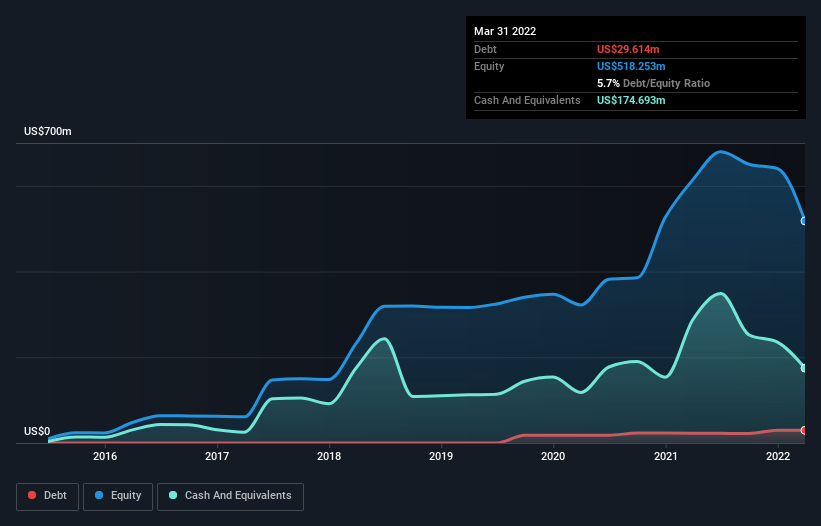
Legendary fund manager Li Lu (who Charlie Munger backed) once said, 'The biggest investment risk is not the volatility of prices, but whether you will suffer a permanent loss of capital.' It's only natural to consider a company's balance sheet when you examine how risky it is, since debt is often involved when a business collapses. Importantly, Boston Omaha Corporation (NYSE:BOC) does carry debt. But should shareholders be worried about its use of debt?
Why Does Debt Bring Risk?
Generally speaking, debt only becomes a real problem when a company can't easily pay it off, either by raising capital or with its own cash flow. Part and parcel of capitalism is the process of 'creative destruction' where failed businesses are mercilessly liquidated by their bankers. However, a more frequent (but still costly) occurrence is where a company must issue shares at bargain-basement prices, permanently diluting shareholders, just to shore up its balance sheet. Of course, plenty of companies use debt to fund growth, without any negative consequences. The first step when considering a company's debt levels is to consider its cash and debt together.
Check out our latest analysis for Boston Omaha
What Is Boston Omaha's Debt?
You can click the graphic below for the historical numbers, but it shows that as of March 2022 Boston Omaha had US$29.6m of debt, an increase on US$22.8m, over one year. However, its balance sheet shows it holds US$174.7m in cash, so it actually has US$145.1m net cash.

How Healthy Is Boston Omaha's Balance Sheet?
Zooming in on the latest balance sheet data, we can see that Boston Omaha had liabilities of US$39.0m due within 12 months and liabilities of US$113.3m due beyond that. Offsetting these obligations, it had cash of US$174.7m as well as receivables valued at US$5.22m due within 12 months. So it actually has US$27.5m more liquid assets than total liabilities.
This surplus suggests that Boston Omaha has a conservative balance sheet, and could probably eliminate its debt without much difficulty. Succinctly put, Boston Omaha boasts net cash, so it's fair to say it does not have a heavy debt load! There's no doubt that we learn most about debt from the balance sheet. But it is future earnings, more than anything, that will determine Boston Omaha's ability to maintain a healthy balance sheet going forward. So if you want to see what the professionals think, you might find this free report on analyst profit forecasts to be interesting.
Over 12 months, Boston Omaha reported revenue of US$60m, which is a gain of 26%, although it did not report any earnings before interest and tax. With any luck the company will be able to grow its way to profitability.
So How Risky Is Boston Omaha?
We have no doubt that loss making companies are, in general, riskier than profitable ones. And in the last year Boston Omaha had an earnings before interest and tax (EBIT) loss, truth be told. Indeed, in that time it burnt through US$36m of cash and made a loss of US$15m. With only US$145.1m on the balance sheet, it would appear that its going to need to raise capital again soon. With very solid revenue growth in the last year, Boston Omaha may be on a path to profitability. By investing before those profits, shareholders take on more risk in the hope of bigger rewards. When analysing debt levels, the balance sheet is the obvious place to start. However, not all investment risk resides within the balance sheet - far from it. For example, we've discovered 1 warning sign for Boston Omaha that you should be aware of before investing here.
At the end of the day, it's often better to focus on companies that are free from net debt. You can access our special list of such companies (all with a track record of profit growth). It's free.
Valuation is complex, but we're here to simplify it.
Discover if Boston Omaha might be undervalued or overvalued with our detailed analysis, featuring fair value estimates, potential risks, dividends, insider trades, and its financial condition.
Access Free AnalysisHave feedback on this article? Concerned about the content? Get in touch with us directly. Alternatively, email editorial-team (at) simplywallst.com.
This article by Simply Wall St is general in nature. We provide commentary based on historical data and analyst forecasts only using an unbiased methodology and our articles are not intended to be financial advice. It does not constitute a recommendation to buy or sell any stock, and does not take account of your objectives, or your financial situation. We aim to bring you long-term focused analysis driven by fundamental data. Note that our analysis may not factor in the latest price-sensitive company announcements or qualitative material. Simply Wall St has no position in any stocks mentioned.
About NYSE:BOC
Boston Omaha
Engages in the outdoor billboard advertising business in the southeast United States.
Adequate balance sheet with acceptable track record.
Similar Companies
Market Insights
Community Narratives



